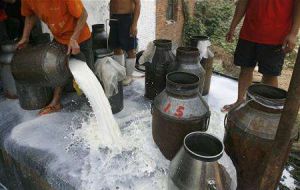MercoPress. South Atlantic News Agency
Contaminated milk products scare reaches FAO

Given the ongoing crisis in China over melamine-contaminated powdered food which has hospitalized nearly 13,000 children, United Nations agencies urged countries to ensure the safe feeding of infants and to be on alert for the possible spread of tainted dairy products.
Commonly used in such materials as containers and labels, melamine can also be found in agricultural products such as fertilizer. Alone, it is of low toxicity, but animal studies have suggested that kidney problems occur when combined with cyanuric acid. "Restoring consumer confidence is critical," said Eddeddine Boutrif, Director of the Nutrition and Consumer Protection Division of the UN Food and Agriculture Organization FAO. "Melamine-contaminated products should be removed from the food chain in order to prevent further exposure." Both FAO and the World Health Organization WHO have advocated breastfeeding and advised against replacing powdered infant formula with other products such as condensed milk, honey mixed with milk or fresh milk. "While breastfeeding is the ideal way of providing infants with the nutrients they need for healthy growth and development, it is also critical to ensure that there is an adequate supply of safe powdered infant formula to meet the needs of infants who are not breastfed," said Jørgen Schlundt, Director of WHO's Food Safety Department. That agency recommended that all infants should be exclusively breastfed for the first six months of life, receiving safe foods and breast milk up to two years of age and beyond. With the possibility that melamine-contaminated products could spread to other countries through both formal and informal channels, both WHO and FAO said that both public authorities and the food industry are responsible for ensuring a safe food supply. "It is critical that the industry strongly invests in food safety and adopts a food safety culture covering the food chain from raw materials through to the final products," Mr. Boutrif said. The recent crisis not only threatens human health, but put the livelihoods of hundreds of millions of dairy farmers at risk. "There is a need for countries to do major investment in strengthening their food control and food-borne disease surveillance systems as it could minimize the potential occurrence of food safety incidents like this one," he added.




Top Comments
Disclaimer & comment rulesCommenting for this story is now closed.
If you have a Facebook account, become a fan and comment on our Facebook Page!